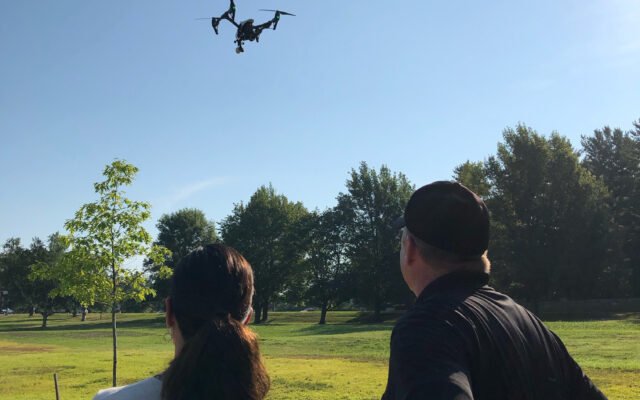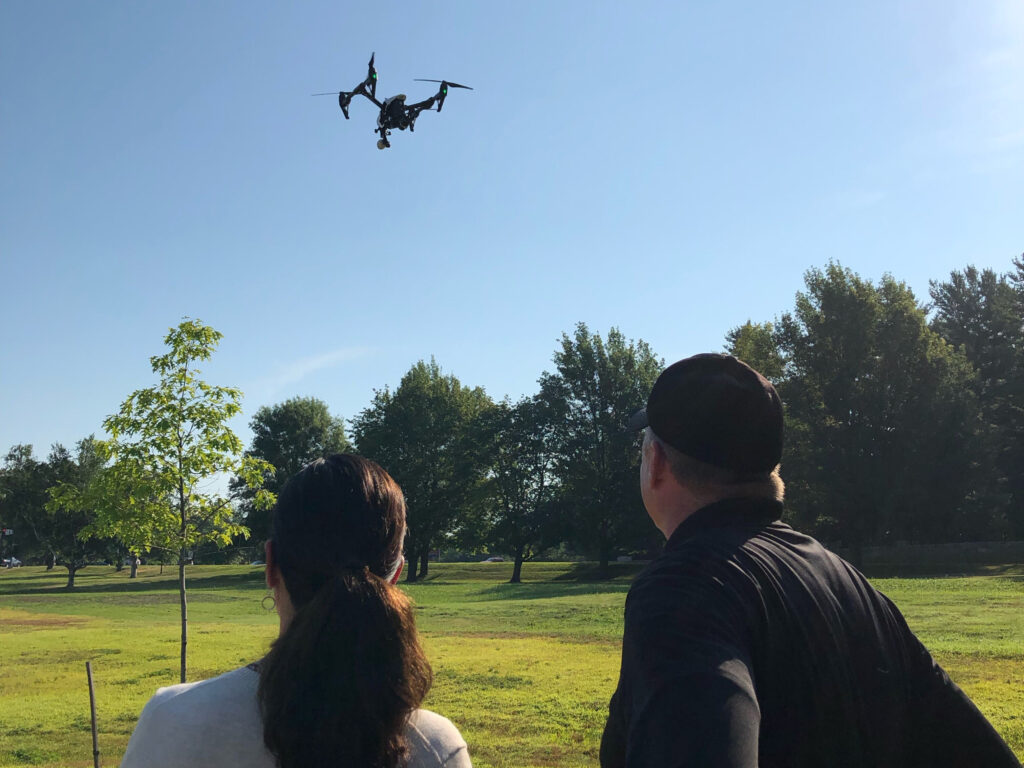
Hunting with a drone? What Maine’s laws don’t say could get you fined
By Julie Harris, Bangor Daily News Staff
Drones, the tiny flying machines first used in the military and now by civilians for everything from crop dusting to animal watching, have found their way into Maine’s hunting arena.
Even though it’s becoming more popular in the United States to use drones for scouting live animals and to find dead ones shot by hunters, Maine’s laws have holes that leave gray areas wide open to interpretation. And that could mean trouble for both hunters and law enforcement.
With game cameras, crossbows and ARs already part of Maine hunters’ arsenal of updated tools, drones are the latest technology to test the state’s nearly 150-year-old hunting laws.
And without clear direction from the state, hundreds of Maine hunters have turned to social media to debate everything from the legality of using drones to recover dead animals to the ethics of using them at all.

DRONE OPERATION — Maine Department of Agriculture, Conservation and Forestry Commissioner Amanda Beal stands with Jeff Currier, regional forest ranger for the Maine Forest Service, as he operates a Maine Forest Service drone.
“There are so many illegal ways to use drones,” said Joseph Socobasin of Indian Township, a hunter and a game warden for the Passamaquoddy Tribe. “As we move forward, we will run into more problems, which may make law changes necessary.”
The law clearly states that it is illegal to hunt with a drone. That means that you cannot use a drone to find an animal and then go kill that particular one, said Lt. Josh Bubier of the Maine Warden Service office in Bangor.
The law’s clarity ends there.
The law does not specifically address any other scenarios, such as scouting prior to hunting and recovering a wounded animal, both areas in which use of drones is on the rise.
That gets into some gray areas, Bubier said.
For example, if you wound an animal and locate it with a drone, you are considered hunting with a drone and are subject to as much as $500 in fines if you get caught. If you are looking for what you believe is a dead animal and you find it using a drone, technically you weren’t using the machine to hunt, but you were hunting with a drone because you didn’t know for sure the animal was dead.
That gets into intent, which is difficult to figure out sometimes, Bubier said.
He said the best thing to do if you are using a drone for scouting is to leave everything related to hunting — guns, ammunition, crossbows, arrows and hunter orange — at home. It isn’t enough to just leave it in the vehicle. If you leave your hunting gear home to operate a drone but have a person with you who has hunting equipment, you can still be cited for hunting with a drone.
Using a drone then shooting the animal you find is not only illegal, it’s unethical, Socobasin said. The state should ban them outright because you have to catch hunters in the act to cite them for illegal use.
He thought the state should require training and licensing for people who want to fly drones to help hunters find the game they’ve shot. It would minimize the chances of people using the surveillance machines illegally, he said.
Using drones to find game in the Maine woods is a waste of time in most areas, he said. The woods are so thick, it’s difficult for the drone’s heat-seeking sensors to penetrate the tree canopy.
A hunter from Cornville said Friday that drones should only be used to recover an animal that’s been shot and can’t be found by other means, such as tracking. Kevin Taft sees technology like drones as going too far beyond what the hunting experience is supposed to be and an invasion into time that should be spent getting in touch with nature. He likes the old ways of boots on the ground.
He has never seen a drone while hunting but wouldn’t use one or hunt with someone who was. He wants to see the animals himself, not on a screen.
“I know I’d be super mad if I was hunting a piece and someone flew a drone into [or] around me. My main purpose to hunt is to be away from things, forget the real world exists and be in my own space taking in God’s creations,” Taft said. “Everything in this world has its place. [I] just don’t think technology as such belongs in the Maine woods.”
He would rather see the Legislature take up other issues that affect hunters, such as Sunday hunting and laws related to hunting on one’s own property.
Hunter Josh Mace of Stockton Springs thinks using drones for hunting violates fair chase, and that the state’s laws should be stronger and fines for violations higher. He said hunters should use all tools available to them to find a dead or wounded animal, and that includes drones.
But there needs to be a system in place to make sure unethical hunters don’t take advantage. He said the drone operator should be licensed for game recovery with the state or the hunter should have a warden present while the recovery drone is in use.
He also questioned the use of dozens of game cameras connected to cellphones, saying it affords the hunter a similar advantage that using drones would.
“I’m a hardcore fisherman and a hardcore outdoorsman,” Mace said. “Where do you draw the line? When does it not become fair chase? [Use of drones and dozens of cellphone game cameras] start to blur the line.”
People should ask themselves if flying the drone is helping them hunt. If so, it could be a violation, Lt. Bubier said. As with other infractions, wardens have to catch people in the act. If a person is cited for a violation, the warden can take the drone.
“We’re always looking at safety, species management and fair chase ethics,” Bubier said. “As technology advances, we need to look at the laws. We should allow technology, but make sure it is used properly.”